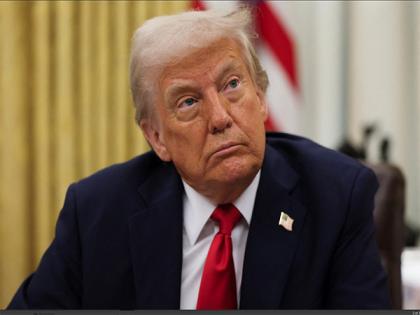"We're going to get along," says Trump, allowing 600,000 Chinese students in US amid ongoing trade talks with Beijing
By ANI | Updated: August 27, 2025 01:30 IST2025-08-27T01:27:18+5:302025-08-27T01:30:05+5:30
Washington [US], August 27 : US President Donald Trump announced that 600,000 Chinese students would be allowed to study ...

"We're going to get along," says Trump, allowing 600,000 Chinese students in US amid ongoing trade talks with Beijing
Washington [US], August 27 : US President Donald Trump announced that 600,000 Chinese students would be allowed to study in American colleges, even as trade negotiations with Beijing continue.
Speaking to reporters at the White House, Trump said the decision was crucial for maintaining ties between the two nations.
"I hear so many stories that we're not going to allow their students," Trump told reporters.
"We're going to allow their students to come in. It's very important, 600,000 students. It's very important. But we're going to get along with China," he added.
Reinforcing his stance on US-China relations, Trump, during a bilateral meeting with South Korean President Lee Jae-myung, stressed that the United States would maintain a "great relationship" with China, while making it clear he would not take actions that could destroy the country.
"We are going to have a great relationship with China...They have some cards. We have incredible cards, but I don't want to play those cards. If I play those cards, that would destroy China. I am not going to play those cards," Trump said.
His remarks came as he signed an executive order "further modifying reciprocal tariff rates to reflect ongoing discussions with the People's Republic of China (PRC)."
Citing authority under the Constitution and several US laws, including the International Emergency Economic Powers Act and the National Emergencies Act, Trump said the measure was necessary due to continuing talks with China to address "the lack of trade reciprocity in our economic relationship and our resulting national and economic security concerns."
The order builds on Executive Order 14257 of April 2, in which Trump had declared that "conditions reflected in large and persistent annual U.S. goods trade deficits... constitute an unusual and extraordinary threat to the national security and economy of the United States," imposing certain ad valorem duties. Subsequent orders in April 2025, Executive Orders 14259 and 14266, raised tariff rates on PRC imports after Beijing announced retaliatory measures.
In May 2025, through Executive Order 14298, Trump suspended the additional ad valorem duties on the PRC for 90 days, replacing them with a revised rate of duty. That suspension was due to expire at 12:01 a.m. EDT on August 12, 2025.
According to the new order, "the PRC continues to take significant steps toward remedying non-reciprocal trade arrangements and addressing the concerns of the United States relating to economic and national security matters." Based on recommendations from senior officials, Trump determined "that it is necessary and appropriate to continue the suspension effectuated by Executive Order 14298 until 12:01 a.m. Eastern Standard Time on November 10, 2025."
The order specifies that "heading 9903.01.63 and subdivision (v)(xiv)(10) of U.S. note 2 to subchapter III of chapter 99 of the HTSUS shall continue to be suspended" until that date.
The Secretary of Commerce, the Secretary of Homeland Security, and the United States Trade Representative, "in consultation with the Secretary of State, the Secretary of the Treasury, the Assistant to the President for National Security Affairs, the Assistant to the President for Economic Policy, the Senior Counselor to the President for Trade and Manufacturing, the Chair of the United States International Trade Commission, and the Postmaster General," have been directed to take all necessary actions to implement the order.
Trump further noted that the measure "shall be implemented consistent with applicable law and subject to the availability of appropriations" and clarified it "is not intended to, and does not, create any right or benefit... enforceable at law or in equity by any party against the United States."
Disclaimer: This post has been auto-published from an agency feed without any modifications to the text and has not been reviewed by an editor
Open in app